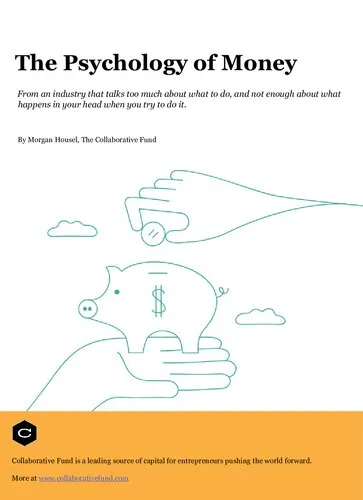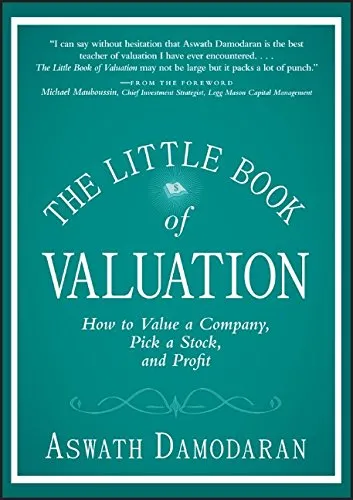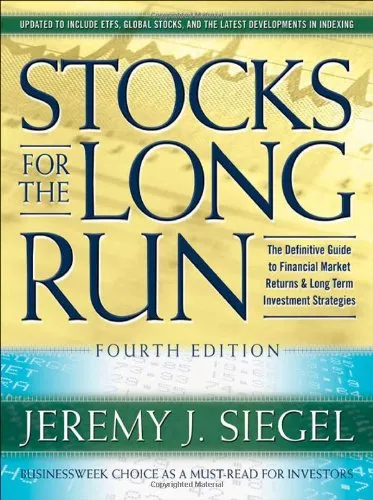The Psychology of Money
4.0
Reviews from our users

You Can Ask your questions from this book's AI after Login
Each download or ask from book AI costs 2 points. To earn more free points, please visit the Points Guide Page and complete some valuable actions.Related Refrences:
Persian Summary
Introduction to "The Psychology of Money"
In today's fast-paced and ever-evolving financial landscape, understanding the psychological underpinnings of money management has never been more crucial. "The Psychology of Money," authored by Professor Michael Argyle and Adrian Furnham, is a profound exploration into the intricacies of how money influences our thoughts, decisions, and behaviors. This book seeks not only to decode the complex relationship between financial habits and psychological processes but also to offer readers nuanced insights that can transform their financial well-being.
By examining the intersections of psychology, economics, and behavioral sciences, "The Psychology of Money" challenges conventional wisdom about finance and provides a fresh and comprehensive perspective on money management. As you embark on this journey through the pages, you will uncover the hidden forces that shape our financial choices and learn practical strategies to enhance both financial and personal prosperity.
Detailed Summary of the Book
"The Psychology of Money" offers a thorough examination of how psychological factors influence financial decision-making. The book is segmented into several key themes, each dissecting different aspects of our relationship with money.
The initial chapters delve into historical perspectives, surveying how cultures across time have perceived wealth and currency. From ancient civilizations to modern-day practices, the narrative establishes a foundational understanding of money's evolving role in society.
Further sections of the book focus on contemporary issues such as consumer behavior, financial literacy, and emotional spending. These chapters uniquely blend empirical research with real-world examples to demonstrate how deeply embedded psychological traits can profoundly influence our financial habits.
Lastly, the authors explore future trends, highlighting the increasing importance of psychological insight in the era of digital finance and globalization. Readers are encouraged to reflect on their personal financial behaviors and consider innovative approaches to managing them.
Key Takeaways
- Understanding the psychological roots of financial behavior can lead to more informed and rational money management.
- Emotional intelligence plays a significant role in financial success, often outweighing pure economic knowledge.
- Diversified strategies that consider psychological aspects can enhance investment and saving outcomes.
- Awareness of our financial biases can help mitigate their impact on decision-making.
Famous Quotes from the Book
"Money is more psychological than numerical; understanding the mind behind the financial choice is the key."
"Our financial fate is not determined purely by market forces or economic theories, but by our perceptions, beliefs, and decisions."
Why This Book Matters
"The Psychology of Money" stands out in the vast sea of financial literature due to its unique focus on the mental and emotional factors influencing financial decisions. Unlike traditional finance books that primarily address numbers and strategies, this book seeks to empower readers with a deeper understanding of the psychological dynamics at play.
At a time when financial systems are becoming increasingly complex and intertwined with our daily lives, the insights provided in this book are invaluable. By highlighting the importance of psychological considerations in money management, it equips readers not only with the knowledge to navigate financial systems but also with the personal insight needed to achieve financial freedom and security.
Free Direct Download
You Can Download this book after Login
Accessing books through legal platforms and public libraries not only supports the rights of authors and publishers but also contributes to the sustainability of reading culture. Before downloading, please take a moment to consider these options.
Find this book on other platforms:
WorldCat helps you find books in libraries worldwide.
See ratings, reviews, and discussions on Goodreads.
Find and buy rare or used books on AbeBooks.
1695
بازدید4.0
امتیاز0
نظر98%
رضایتReviews:
4.0
Based on 0 users review
Questions & Answers
Ask questions about this book or help others by answering
No questions yet. Be the first to ask!















